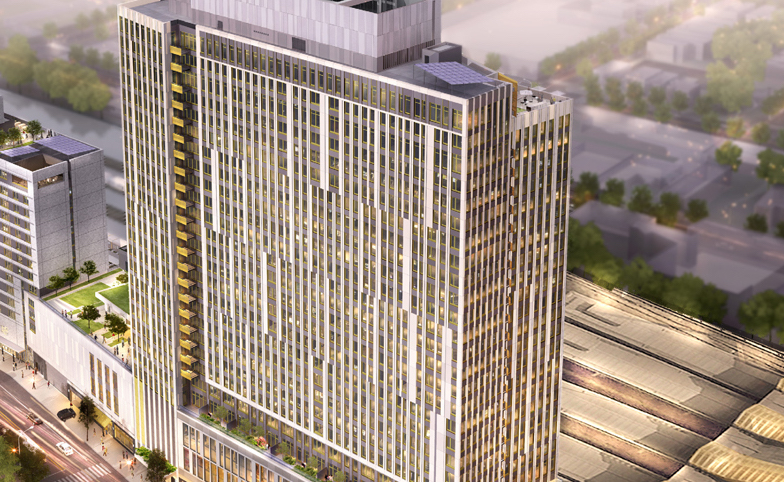In the North American green buildings market, where LEED, BREEAM, WELL, Living Building Challenge, and Green Globes dominate the landscape, the German-born Passivhaus standard (aka, Passive House) has struggled to gain a solid foothold, despite a strong grassroots growth effort among its early adopters.
There are an estimated 60,000 buildings worldwide designed and built to Passivhaus standards, the vast majority in Europe. In the U.S., more than 1.1 million sf of building space is certified or pre-certified to PHIUS+ standards, according to the Passive House Institute US. But the lion’s share is small residential buildings.
A new study conducted by FXFOWLE and funded by the New York State Energy Research and Development Authority set out to determine the viability of Passivhaus for tall residential buildings. The research involved investigating the feasibility of adapting the design of a sustainable mixed-use high-rise building in the 2016 New York City market to Passivhaus requirements. The base case building is a 593,000-sf, 26-story multifamily high-rise building in Queens that is targeting LEED v.3 Silver Certification and 20% energy cost savings from ASHRAE 90.1-2007. The study examined the impacts of achieving the standard from an architectural, enclosure detailing, mechanical, structural, constructability, resiliency, zoning, and code perspective.
FXFOWLE’s findings show promise for the niche standard. The technical difficulties of meeting the stringent energy efficiency and insulation standards can be overcome with minimal aesthetic changes and a glazing ratio of up to 40%, according to the report’s authors, Ilana Judah, Intl. Assoc. AIA, LEED AP, Principal, Director of Sustainability, and Daniel Piselli, AIA, LEED AP, Senior Associate, both with FXFOWLE.
From a financial perspective, the Passivhaus design represents an increased capital cost of 2.4%, a 40-year net present value of $5.2 million, and a payback of 24 years as compared to the base case building.
“The multifamily project type and scale are favorable to meet Passivhaus requirements due to controllable internal heat gains and low enclosure to volume ratios,” the authors wrote. “Some code and regulatory requirements conflict with Passivhaus strategies, and these must be aligned to enable implementation.”
Related Stories
Green | Jul 8, 2024
Global green building alliance releases guide for $35 trillion investment to achieve net zero, meet global energy transition goals
The international alliance of UK-based Building Research Establishment (BRE), the Green Building Council of Australia (GBCA), the Singapore Green Building Council (SGBC), the U.S. Green Building Council (USGBC), and the Alliance HQE-GBC France developed the guide, Financing Transformation: A Guide to Green Building for Green Bonds and Green Loans, to strengthen global cooperation between the finance and real estate sectors.
Sustainability | Jul 1, 2024
Amazon, JPMorgan Chase among companies collaborating with ILFI to advance carbon verification
Four companies (Amazon, JPMorgan Chase, JLL, and Prologis) are working with the International Living Future Institute to support development of new versions of Zero Carbon Certification.
Sustainability | Jun 24, 2024
CBRE to use Climate X platform to help clients calculate climate-related risks
CBRE will use risk analysis platform Climate X to provide climate risk data to commercial renters and property owners. The agreement will help clients calculate climate-related risks and return on investments for retrofits or acquisitions that can boost resiliency.
Building Technology | Jun 18, 2024
Could ‘smart’ building facades heat and cool buildings?
A promising research project looks at the possibilities for thermoelectric systems to thermally condition buildings, writes Mahsa Farid Mohajer, Sustainable Building Analyst with Stantec.
University Buildings | Jun 18, 2024
UC Riverside’s new School of Medicine building supports team-based learning, showcases passive design strategies
The University of California, Riverside, School of Medicine has opened the 94,576-sf, five-floor Education Building II (EDII). Created by the design-build team of CO Architects and Hensel Phelps, the medical school’s new home supports team-based student learning, offers social spaces, and provides departmental offices for faculty and staff.
Codes and Standards | Jun 17, 2024
Federal government releases national definition of a zero emissions building
The U.S. Department of Energy has released a new national definition of a zero emissions building. The definition is intended to provide industry guidance to support new and existing commercial and residential buildings to move towards zero emissions across the entire building sector, DOE says.
Green | Jun 11, 2024
Tool helps construction and renovation projects with CalGreen compliance
One Click LCA recently launched a new software tool to help building teams comply with Part 11, Title 24, of the California Code of Regulations—CALGreen. The regulation is the nation’s first state-mandated green building code to include embodied carbon emission control as a mandatory component, effective from July 1, 2024.
Mass Timber | May 31, 2024
Mass timber a big part of Western Washington University’s net-zero ambitions
Western Washington University, in Bellingham, Wash., 90 miles from Seattle, is in the process of expanding its ABET-accredited programs for electrical engineering, computer engineering and science, and energy science. As part of that process, the university is building Kaiser Borsari Hall, the 54,000-sf new home for those academic disciplines that will include teaching labs, research labs, classrooms, collaborative spaces, and administrative offices.
MFPRO+ New Projects | May 29, 2024
Two San Francisco multifamily high rises install onsite water recycling systems
Two high-rise apartment buildings in San Francisco have installed onsite water recycling systems that will reuse a total of 3.9 million gallons of wastewater annually. The recycled water will be used for toilet flushing, cooling towers, and landscape irrigation to significantly reduce water usage in both buildings.
MFPRO+ News | May 28, 2024
ENERGY STAR NextGen Certification for New Homes and Apartments launched
The U.S. Environmental Protection Agency recently launched ENERGY STAR NextGen Certified Homes and Apartments, a voluntary certification program for new residential buildings. The program will increase national energy and emissions savings by accelerating the building industry’s adoption of advanced, energy-efficient technologies, according to an EPA news release.

















